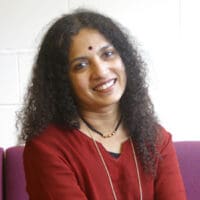Overview
In trying to understand the nature of self, there is often a focus on language and concepts as mediators of human experience. However, there is human experience long before language and concepts are possible. And our attempts to understand the self, what it is, when it emerges, and in fact how and why it is, need to begin from there. In this session, Vasudevi Reddy would like to focus on the early months of human infancy, as the phenomena evident in these months contain crucial answers to questions about the origins of self. Even before birth, infants learn to adapt and be like’ the auditory world they experience and show evidence of increasingly complex emotional expressions. The boundaries of the self are fluid, but with an affective core. At birth, infants are quite able to discriminate self from non-self, distinguishing their own from others’ touch, and interested in connections between what they feel and what they see. The self develops relationally, in engagement with the world; a process which needs the infant to be open, the world to recognize this, and the infant to recognize this recognition. From very early in life, infants show openness to things and to people, recognition of aspects of other minds (especially when other minds address the infant directly), and can develop along different paths depending on their experience. The fundamental playfulness of infant selves is a product of their openness and can lead to entirely new paths for those who join their play.
- Dialogue 3019 sessions
- December 16, 2015Sera Monastery, Bylakuppe, India


